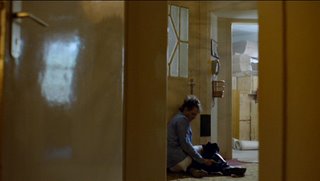The central character is Elvira, a lonely transsexual who is cruising for gay men when the film opens. A potential john makes the first advances, but when he discovers that it’s a woman he’s feeling up, he responds violently and calls a few buddies to assist. This establishes a pattern that we will see repeatedly throughout the film. Elvira tries to connect with someone, and everyone she approaches rejects her.
Take for instance, her lover Christoph. He shares her apartment, and when she returns home from the beating, he turns on her. When I first saw this film at Cinematheque Ontario a couple of years ago, I nearly walked out during this scene. That’s the level of the emotional cruelty that is directed at Elvira here. Incredibly, she absorbs it, and in fact apologizes and promises to do better.

A kindly whore named Zora befriends Elvira, and she becomes her companion for the balance of the film. The presence of this second person gives Elvira a sounding board, and enables us to learn some of Elvira’s back-story. Elmira talks of her previous life as an abattoir worker named Erwin, and this leads to a grisly sequence in an actual slaughterhouse. As Elvira talks of her transformation and her life with the abusive Christoph, we watch cattle having their throats slit and their hides pulled off. This scene is a real gut-slammer, and it serves a couple of purposes. First, it mirrors the mutilation that Elvira herself has undergone – her quickie sex change. Additionally, it’s an effective metaphor for the world in which she resides. To the people around her, Elvira has about the same status as the cattle do to the slaughterhouse workers.
The centerpiece of the film is a visit by Elvira and Zora to the orphanage where Elvira grew up. They encounter Sister Gudrun, who remembers the young Erwin, and goes into a lengthy monologue about how Erwin was abandoned as a baby, how a young couple wanted to adopt him, and how his biological mother nixed the adoption rather that have the father know of Erwin’s existence. This scene is heartbreaking; as it indicates how close Erwin came to having a loving family, only to have it snatched away from him.

Why did Erwin become Elvira? That’s the question that the film revolves around, and early on, the name Anton Saitz comes into play. Saitz is a wealthy industrialist and concentration camp survivor who has some hidden connection to Elvira, which she has alluded to in a newspaper interview. Elvira sets out to track Saitz down, in order to persuade him from taking revenge on her, or worse yet, on her estranged daughter.
Elvira eventually makes her way to Saitz’ office tower, and if you watched this film, and were able to anticipate what the meeting would be like, you are a far better man than me. The first thing that is noticeable is how the office seems to be virtually deserted. Elvira encounters a security guard and when asked for the password, is able to dig it up out of her memory banks - “Bergen-Belsen”. The scene in Saitz’ office is bizarre, to say the least. When Elvira arrives, Saitz and his associates are re-enacting an absurd dance number from an old Jerry Lewis film.

Saitz is the one who finally fills out the blanks in Elvira’s past. Ervin was in love with Saitz once, and told him so. Saitz’ response was a flippant “That’s nice – Too bad you’re not a woman.”, and Erwin took it to heart and ran off to Casablanca for a sex change operation.
This astonishing lack of judgment is in fact consistent with what we have already seen with Elvira. She is desperate to connect with someone, whether it is her ex-wife or a john in a park. Time and time again in his films, Fassbinder gives us people who need love badly, don’t have a clue about how to get it, and are destroyed as a result of it. There’s the needy actress in Veronika Voss, the designer in The Bitter Tears of Petra Von Kant, or the lottery winner Fox in Fox and His Friends, just to name a few.
As I mentioned at the beginning, this movie is connected to the story of Armin Meier, and his relationship with Fassbinder. It’s no stretch to say that Meier informs the character of Elvira – Someone who loves the wrong people, and suffers because of it.
This might be the most personal and painful of the films Fassbinder made. Just how personal can be guessed at when you look at the credits. This is essentially a one-man film. Fassbinder wrote, produced, directed, shot and edited 13 Moons. It almost seems like this film was his penance, and he had to suffer it alone.
No comments:
Post a Comment